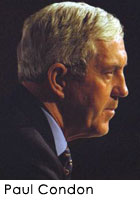An incomplete journey
Sujata Prakash
Sir Condon's report reads like a smashing whodunit, without the denouement at the end. There is murder, but the killer is at large and the motive unclear. There is kidnapping, but the victim is unknown. Players have received death threats but they remain in the shadows. Match-fixers still exist, but damned if there is enough evidence to reveal their identities!
 What Sir Condon does reveal is what we have known all along; mainly that the ICC in particular is to blame for the events spiralling out of control in the last few years, and that the proliferation of one day cricket in neutral venues has made it easier for the bookie to offer the bribe and the player to take it.
What Sir Condon does reveal is what we have known all along; mainly that the ICC in particular is to blame for the events spiralling out of control in the last few years, and that the proliferation of one day cricket in neutral venues has made it easier for the bookie to offer the bribe and the player to take it.
But despite its shortcomings, the report is a welcome first step towards getting the cricket world to clean up its act. That the act has to be cleaned up is obvious, how it will be cleaned up is not so obvious. Sir Condon has provided some guidelines, but he speaks more like the policeman he is rather than the judge needed to decide the terms of the sentence.
We now know, for example, that drugs have crept in, but when some South African players were caught using the weed they got away with a light fine. The old story of the board saying it was a one-off incidence and hoping for it to be true is being repeated. Unfortunately there is no head-on collision with the boards in the report, so your guess is as good as mine if such attitudes can be changed.
Obviously, the first step needed for that is to not treat any incidence of suspected match fixing as a one-off affair, but give it the due consideration it deserves. Players who are still under a cloud must be investigated, and fast. It doesn't matter if all they took was a token of appreciation for giving weather information. They must be made to leave the field. It's ridiculous to see five Indian players banned from the game, while every other Test-playing country (except Zimbabwe and Bangladesh) protect their own for no logical reason.
As Sir Condon suggests, the ICC must now establish itself as the central governing body of cricket and stop being the 'loose and fragile alliance' it is. Someone has to take action when cricket boards turn recalcitrant in the face of even insurmountable evidence. We can see how Lord MacLaurin has pronounced Alec Stewart not guilty without a trial; Mark Waugh and Shane Warne seem to have nine lives each, and lets be honest, can Brian Lara ever get convicted even if guilty?
What the ICC needs to perhaps do is make every player sign an agreement that he is answerable to it, and that the ICC has the power to ban a player for life if necessary. It might be, for the most part, just a threat on paper, but it is the added impetus that is needed to cut the waffling. If according to Lord Condon there is a real threat to the board administrators and players from the underworld, thus forcing them to sometimes keep quiet, then there is even more reason for the ICC to enhance its own powers.
But for the moment, its back to waiting for the Sir Condon Report Part 2. Next month promises more revelations and if the hints are to be believed, its going to be a real page turner. Hopefully this time, the last page won't leave us asking 'whodunit?'
Sujata Prakash